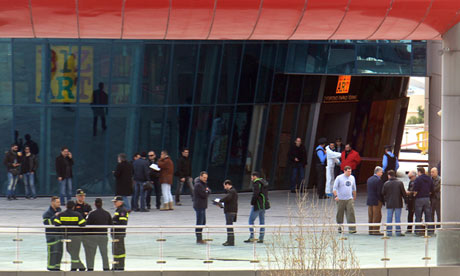In the space of just a couple of weeks Greece's largest shopping mall has been targeted in a bomb attack, gunmen have fired on the headquarters of the ruling New Democracy party, and gas canisters have been set off outside an array of political party offices, banks and the homes of journalists.
Now three days after the attack on the shopping centre – which sent counter-terrorist officials on a painstaking hunt that has, as yet, borne little fruit – fears are mounting that Greece's fragile political stability could be shattered by extremists determined to exploit fury over unpopular austerity.
"The government is very, very concerned," said a senior aide to one of the coalition's tripartite leaders. "Political stability is essential to getting through the year."
In a nation that thought the spectre of terrorism had been laid to rest – with the dissolution, a decade ago, of the notorious November 17 group – the appearance of gangs prepared to take unprecedented risks has put authorities on edge.
After the office of the conservative prime minister, Antonis Samaras, was targeted in the attack on New Democracy's central offices, urban guerillas upped the ante on Sunday, placing a bomb in Athens' biggest commercial centre, a massive shopping mall popular with families.
Two security guards were lightly injured in the blast after warning calls to two local media outlets, barely 50 minutes earlier, triggered a panic-stricken evacuation of nearly 300 people from the building. Many were children about to see movies. Initially the government blamed the violence on forces of the anti-austerity left, saying militants were taking revenge following a raid on a squat in the capital that had led to the arrest of scores of anarchists. Hundreds of petrol bombs, often used against riot police in demonstrations, were also confiscated.
In a bid to limit the influence of far-right extremists gathered around the neo-Nazi Golden Dawn party, the conservative-dominated coalition has given added emphasis to law and order since assuming power in June.
"The police, by cracking down on their traditional anti-authority adversaries, are attempting to reclaim the law and order mantle for the current government," says former US diplomat Brady Kiesling, who has been studying Greek far left-anarchist violence for a forthcoming book. "The anarchists [in turn] are determined to humiliate them with symbolic attacks."
But experts say the attack on the mall is also a dangerous indicator of the determination to escalate the violence. "What is more puzzling and more worrisome is what happened at the mall," said Dr Thanos Dokos, a defence expert who heads Eliamep, Greece's pre-eminent thinktank.
"Explosive devices can go off accidentally, at any given time. Innocents, people who are not your normal targets, could have been killed … clearly when you do such a thing you have made a decision to escalate [violence]," he said.
"In normal times I'd say we could have easily survived this knowing that such groups would barely have made an impact," added Dokos. "Now I am worried about the negative publicity it could have on the country and potential investors, especially in the runup to the tourist season, if they start targeting foreigners … and decide to hurt people."
This week, the US state department issued a travel advisory warning US citizens to be on the alert.
The violence has poisoned a political atmosphere already fraught with tension. The main opposition radical left Syriza party on Wednesday accused the government of attempting to sow the seeds of a "civil war" by associating the left exclusively with the attacks.
The climate reached boiling point when government spokesman Simos Kedikoglou accused a Syriza MP of being "terrorist friendly" after the leftwing politician denounced the everyday violence visited on Greeks by austerity measures the country has been forced to apply in return for rescue funds from the European Union and International Monetary Fund.
The MP, Vangelis Diamantopoulos, told supporters that exasperated Greeks has been given an excruciating choice between "either committing suicide or picking up a gun.
"What we say is: join us and turn this rage into a creative movement. That's the clear message form Syriza."
Security experts say they are under no doubt that the country's economic crisis – and with it the collapse of mainstream parties that have dominated the political scene since the end of military rule in 1974 – have provided fertile ground for extremists groups to flourish.
"The recruitment pool has definitely got bigger," said Mary Bossi who specialises in international terrorism at the University of Piraeus. "The empty space that opened up when political parties stopped being persuasive is filling up with extremists," she said, adding that while the groups were "extremely diversified" they included middle class youths from privileged backgrounds. "We will see more violence in the future and attacks that may well be much more lethal."

No comments:
Post a Comment